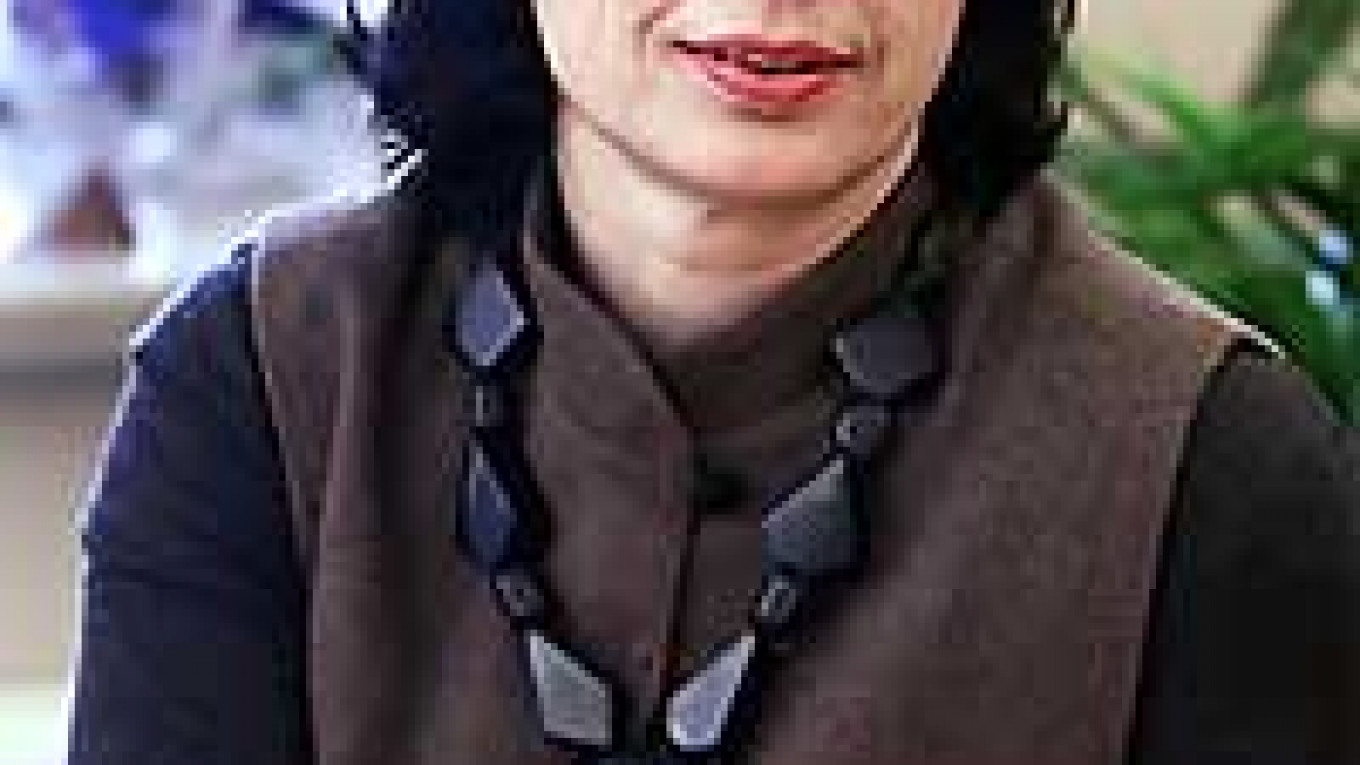Nor did she know, as she now says, that Russia would open its heart to her, offering devoted friends, love and a brilliant career.
But she did know one thing: "I was fascinated with the incredible vigor and might of this country," she says. "It differed from everything I had read or heard about it."
Nearly four decades later, Commeau, 46, is the head of the European Business Club, one of the most influential foreign organizations in Russia. Founded in 1995, the club blossomed into a major force in the Moscow business arena.
"We are playing a double role," says Commeau, "On the one hand, we are a dynamic face of Europe in Russia, while on the other, we inform the West about doing business in this country."
Being a foreigner and a woman in Russia's business circles can challenge even the most seasoned veterans of commerce. But what some may consider a challenge, Commeau views as a blessing.
"As a woman, I have many advantages because there are not that many women in the Russian business arena, and that makes me memorable," she says.
Recounting her rapid professional growth in this country, Commeau says she greatly values the connections she established over the years. Her personal database overflows with the cream of the crop of Russia's business and government leaders, including the leader of the Fatherland-All Russia coalition, Yevgeny Primakov, Yabloko leader Grigory Yavlinsky, Deputy Prime Minister Viktor Khristenko and Moscow Mayor Yury Luzhkov.
As a result, the club regularly meets with State Duma deputies, government ministers, high-ranking officials and governors of Russian regions, acting as a vibrant lobbying force that articulates and defends its members' business interests in Russia.
"Many Westerners cannot properly evaluate this country and use its resources. To be successful here, you need to be clued into the local dynamics and have savvy communication skills," says Commeau.
Commeau has both. Her striking looks, with almond-shaped brown eyes and a warm smile, complement her nearly flawless Russian, which she learned from her mother, a French-born Russian immigrant.
During her Paris childhood, Commeau's fascination with her mother's homeland developed into a devotion to Russian literature and, later, Soviet studies.
As a young but seasoned expert who could navigate through the Soviet system, she landed a job as a political adviser to the European Bank for Reconstruction and Development and transferred to Moscow following the 1991 political coup.
Both the Russians and the French sought her opinion on the latest developments in Russia. While she worked as an adviser to the French industry minister, she also accepted a part-time consulting position for the St. Petersburg city government, then lead by Anatoly Sobchak. In that role, she met several characters that have since moved up the career ladder: President Vladimir Putin, Economic Development and Trade Minister German Gref and Unified Energy Systems CEO Anatoly Chubais.
The rest, says Commeau, is history. She settled in Russia, marrying former Energy Minister Vladimir Lopukhin, who had a reputation as a liberal economist, and giving birth to two children. When the marriage ended in divorce, she bought a country house 250 kilometers southeast of Moscow.
"It was like living in the 18th century, with electricity as the only sign of civilization. But to understand Russia, I had to learn about living in the countryside," she says.
Commeau planned to stay in seclusion to write a book on her experiences in Russia, but her life took a new turn. When a headhunter called, offering a managing director position at the EBC, she accepted and never looked back.
Last year, as proposed economic reforms and a recovering economy promised to improve the business climate, the EBC's membership swelled to 420, representing all 15 European Union member states.
This year, Commeau plans to keep herself busy: She will focus on further expanding the EBC's membership and lobbying to resolve challenges that still dog European enterprises.
Russia remains an unpredictable and often corrupt place in which to do business. Yet, Commeau says, foreigners who are committed to growing their businesses here have a once-in-a-lifetime opportunity because they enjoy a "much wider amplitude of creative possibilities compared to the West."
While she is committed to the EBC for now, Commeau says she is also flirting with the idea of working for a Russian multinational where her energy, business contacts and love for the country can materialize into grandiose projects ?€” and success.
A Message from The Moscow Times:
Dear readers,
We are facing unprecedented challenges. Russia's Prosecutor General's Office has designated The Moscow Times as an "undesirable" organization, criminalizing our work and putting our staff at risk of prosecution. This follows our earlier unjust labeling as a "foreign agent."
These actions are direct attempts to silence independent journalism in Russia. The authorities claim our work "discredits the decisions of the Russian leadership." We see things differently: we strive to provide accurate, unbiased reporting on Russia.
We, the journalists of The Moscow Times, refuse to be silenced. But to continue our work, we need your help.
Your support, no matter how small, makes a world of difference. If you can, please support us monthly starting from just $2. It's quick to set up, and every contribution makes a significant impact.
By supporting The Moscow Times, you're defending open, independent journalism in the face of repression. Thank you for standing with us.
Remind me later.


